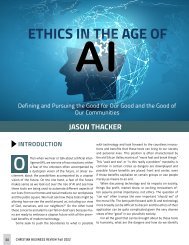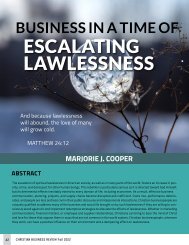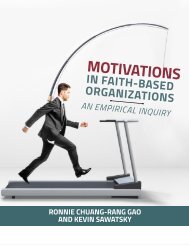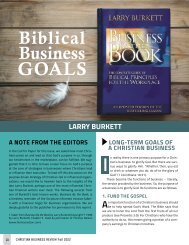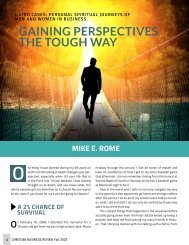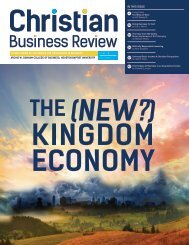Christian Business Review 2018: Kingdom Business in the Brave New World (Issue 7)
You also want an ePaper? Increase the reach of your titles
YUMPU automatically turns print PDFs into web optimized ePapers that Google loves.
shalom and moral imag<strong>in</strong>ation<br />
Introduction<br />
As <strong>Christian</strong>s strive to be salt and light 1 <strong>in</strong> <strong>the</strong><br />
organizations <strong>in</strong> which <strong>the</strong>y work, <strong>the</strong>y will<br />
encounter technological change that <strong>in</strong>fluences<br />
<strong>the</strong> form and goals of that work. 2 Although <strong>the</strong>se<br />
changes are driven by scientific and eng<strong>in</strong>eer<strong>in</strong>g <strong>in</strong>novation,<br />
<strong>the</strong>ir <strong>in</strong>fluences and impacts are cultural, 3 and<br />
<strong>Christian</strong>s <strong>the</strong>refore must discern 4 whe<strong>the</strong>r and how such<br />
changes fulfill <strong>the</strong> cultural mandate to “fill <strong>the</strong> earth and<br />
subdue it.” 5 Do <strong>the</strong>se changes, <strong>in</strong> <strong>the</strong>ir implications for a<br />
person’s relationship with her- or himself, with God, with<br />
o<strong>the</strong>r people, or with <strong>the</strong> natural world, contribute to <strong>the</strong><br />
peaceful <strong>in</strong>terdependence among <strong>the</strong>se (i.e., shalom) 6 , or<br />
do <strong>the</strong>y disrupt that shalom? That is, do <strong>the</strong>y qualify as<br />
“culpable shalom-break<strong>in</strong>g,” or s<strong>in</strong>? 7<br />
I will suggest <strong>in</strong> this essay that technology can contribute<br />
positively to human life <strong>in</strong> social and economic<br />
terms, but that some of its applications are exploitative<br />
or idolatrous ra<strong>the</strong>r than contributory. I will <strong>the</strong>n argue<br />
that <strong>Christian</strong>s should strive <strong>in</strong> <strong>the</strong>ir stakeholder relationships<br />
for “shalom,” that is, <strong>the</strong> peace between a person and<br />
God, o<strong>the</strong>rs, her- or himself, and <strong>the</strong> natural world that is<br />
described <strong>in</strong> Scripture as God’s will for His creation. I will<br />
next expla<strong>in</strong> how some technological shifts <strong>in</strong> stakeholder<br />
relationships are consistent with that shalom, and o<strong>the</strong>rs<br />
are not. I will f<strong>in</strong>ally argue that moral imag<strong>in</strong>ation is one<br />
way that <strong>Christian</strong>s may realize opportunities to be salt<br />
and light 8 <strong>in</strong> <strong>the</strong> organizations <strong>in</strong> which <strong>the</strong>y work, by recogniz<strong>in</strong>g<br />
stakeholder relationships that lack shalom and<br />
reconfigur<strong>in</strong>g <strong>the</strong>m so that <strong>the</strong>y can enjoy such peace.<br />
Technology and Value Creation<br />
Every technology is <strong>in</strong>vented to do someth<strong>in</strong>g, at <strong>the</strong> very<br />
least to amuse its creator or its user. Therefore, all technologies<br />
embody <strong>the</strong>ir <strong>in</strong>ventors’ <strong>in</strong>tentions; 9 <strong>in</strong> addition<br />
to unanticipated “off-label” uses, a technology does what<br />
it was <strong>in</strong>vented for, to some better or worse extent. In<br />
particular, technology tends to serve <strong>the</strong> <strong>in</strong>terests of one<br />
stakeholder group, capital, more reliably than it serves <strong>the</strong><br />
<strong>in</strong>terests of o<strong>the</strong>r stakeholders, 10 because capital funds <strong>the</strong><br />
research, development, production, and distribution of a<br />
given technology. Technologies that do not benefit capital<br />
are not funded through <strong>the</strong> development and launch cycle.<br />
So although some technologies are developed by and for<br />
o<strong>the</strong>r stakeholders (as workers may create new tools,<br />
or consumers may build freeware), most technologies<br />
need to earn a return on <strong>the</strong>ir funders’ <strong>in</strong>vestments. In<br />
particular, this phenomenon expla<strong>in</strong>s <strong>the</strong> paradox of <strong>in</strong>creas<strong>in</strong>g<br />
prevalence of labor-sav<strong>in</strong>g technologies <strong>in</strong> workplaces<br />
around <strong>the</strong> world, while hours worked and wage<br />
growth have stagnated for many workers: labor-sav<strong>in</strong>g<br />
technologies are not typically developed, purchased, and<br />
implemented to help workers make more money with less<br />
CBR PEER REVIEWED ARTICLES<br />
effort, but <strong>in</strong>stead are <strong>in</strong>tended to help <strong>the</strong> purchasers of<br />
that capital equipment make more money with less labor<br />
(or less-expensive labor). 11<br />
There are three ways that a new technology can generate<br />
value for its owner or seller. One is by creat<strong>in</strong>g value<br />
for <strong>the</strong> user, as <strong>the</strong> user is able to do someth<strong>in</strong>g heretofore<br />
difficult or impossible, or is simply able to do someth<strong>in</strong>g<br />
faster or better. A dishwasher does someth<strong>in</strong>g that people<br />
have done for centuries, but vastly reduces <strong>the</strong> time that<br />
people spend at it, and <strong>in</strong> many cases does a better job.<br />
An airplane makes transcont<strong>in</strong>ental travel (or even some<br />
daylong bus<strong>in</strong>ess trips to ano<strong>the</strong>r state) possible, when<br />
<strong>the</strong> time required for <strong>the</strong>se activities would have once<br />
been prohibitive. These th<strong>in</strong>gs have value, and that value<br />
is divided between <strong>the</strong> user, <strong>the</strong> owner, <strong>the</strong> seller, and <strong>the</strong><br />
<strong>in</strong>ventor; for <strong>in</strong>stance, if I value gett<strong>in</strong>g from Chicago to Los<br />
Angeles at <strong>the</strong> start of March <strong>in</strong> a matter of hours ra<strong>the</strong>r<br />
than days more than I value $500, <strong>the</strong>n I buy <strong>the</strong> ticket<br />
and take my flight. If that time sav<strong>in</strong>gs was worth $1200<br />
to me, <strong>the</strong>n <strong>the</strong> $1200 of value created by <strong>the</strong> technology<br />
is divided <strong>in</strong>to $700 of consumer surplus 12 and $500 of<br />
producer surplus 13 (assum<strong>in</strong>g that <strong>the</strong> seat would be<br />
flown empty if I hadn’t bought it, so sell<strong>in</strong>g it to me is a<br />
pure $500 ga<strong>in</strong> to <strong>the</strong> airl<strong>in</strong>e). The airl<strong>in</strong>e <strong>in</strong> turn leased an<br />
airplane <strong>in</strong> anticipation of sell<strong>in</strong>g seats on it, whose value<br />
exceeded <strong>the</strong> cost of leas<strong>in</strong>g and operat<strong>in</strong>g <strong>the</strong> airplane . . .<br />
and Boe<strong>in</strong>g designed and built <strong>the</strong> airplane <strong>in</strong> anticipation<br />
of sell<strong>in</strong>g it for more than its all-<strong>in</strong> cost to <strong>the</strong> company.<br />
Everybody w<strong>in</strong>s. So far, so good.<br />
But, <strong>the</strong>re are o<strong>the</strong>r ways to create value for <strong>the</strong> owner<br />
or seller of a technology. One is by us<strong>in</strong>g <strong>the</strong> technology<br />
to appropriate more of <strong>the</strong> o<strong>the</strong>r party’s surplus. For <strong>in</strong>stance,<br />
as I surf <strong>the</strong> web and browse new w<strong>in</strong>ter coats,<br />
<strong>the</strong> servers host<strong>in</strong>g <strong>the</strong> pages I visit may recognize my<br />
physical location as be<strong>in</strong>g populated mostly by people<br />
of a certa<strong>in</strong> socioeconomic status. In anticipation of my<br />
estimated greater will and ability to pay for a new coat,<br />
those servers present me with higher prices than <strong>the</strong>y<br />
present to visitors from lower-<strong>in</strong>come zip codes. That<br />
technology creates value for <strong>the</strong> user (i.e., <strong>the</strong> website I<br />
visit), and <strong>the</strong> seller (<strong>the</strong> developer of <strong>the</strong> software), but<br />
not for me. Similarly, I may use OpenTable to book restaurant<br />
reservations; restaurants pay OpenTable to manage<br />
<strong>the</strong>ir reservations, and to direct d<strong>in</strong>ers to <strong>the</strong>m, both of<br />
which have value to <strong>the</strong> restaurant. But perhaps I use<br />
OpenTable to reserve a table right before walk<strong>in</strong>g <strong>in</strong>to <strong>the</strong><br />
restaurant that I was about to enter anyway, just to garner<br />
reward po<strong>in</strong>ts <strong>in</strong> <strong>the</strong> application. I can use those po<strong>in</strong>ts<br />
for a gift certificate <strong>in</strong> a few months. But <strong>the</strong> restaurant<br />
has directly paid OpenTable (and <strong>in</strong>directly paid me) for<br />
someth<strong>in</strong>g that was go<strong>in</strong>g to happen anyway. OpenTable<br />
and I have cooperated to exploit <strong>the</strong> restaurant.<br />
F<strong>in</strong>ally, technology may be used to generate value by<br />
creat<strong>in</strong>g or obscur<strong>in</strong>g externalities. Factory automation<br />
raises productivity <strong>in</strong> part because mach<strong>in</strong>es do <strong>the</strong> work<br />
of some people, so that <strong>the</strong> people who rema<strong>in</strong> produce<br />
CHRISTIAN BUSINESS REVIEW fall <strong>2018</strong> 31




